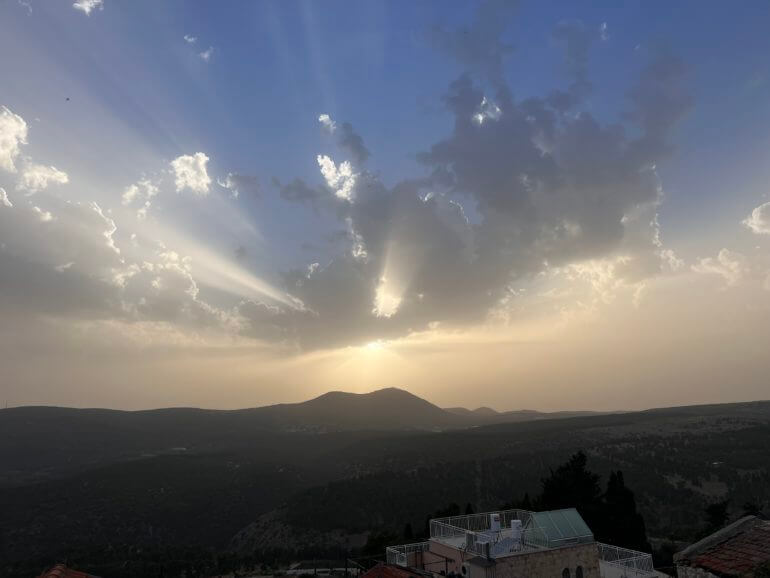
During Covid’s Quarantine, I Returned To Torah And Found Freedom
Approaching Shavuot and counting the Omer–the Kabbalistic process between Passover and Shavuot—I remember my teshuva story. I was an Israelite unknowingly enslaved to a foreign culture, only to break through the goo of exile and receive the treasure of Torah. I returned to myself in isolation. Perhaps it had to be that way. I was living in Minneapolis, Minnesota, where I moved after college. I enjoyed the stoic coolness of the locals and their easy attitude during polar vortices. I worked for a hip marketing technology company and frequented breweries after work, watching the Vikings lose, not knowing football rules.
It was the “idyllic” American dream I hadn’t known but always wanted, being traditionally Jewish from Miami Beach. For a while, I thought I would settle in the Midwest permanently. I was engaged with the local Chabad, where I attended Shabbat dinners, but my spiritual appetite at the time was sated by the teachings of Michael Singer and Ram Das (yes, both Jews).
During the late winter of 2020, life was all fun. It felt too good to be true. And it was. My office was lively, I’d sip cappuccinos at the custom-made geode tables in the industrial office that was a former mill. I worked out at a massive fitness facility and loved warrior sculpt classes. I was a friend to all. People in Minneapolis were “Minnesota nice,” and I could talk to anyone.
In late February, at a Spa for the Soul event Chabad hosted for women, I was asked to emcee a panel of spiritual teachers. One of the women explained Mitrayim as a narrow place—sharing the root tzar, which means “straits” or “distress”—where we are constricted in our consciousness. I was bewildered and intrigued by the teaching. Then she said, “This Purim, we’ll all be wearing masks.” I rolled my eyes.
The day before lockdown was Shabbat and I attended a day party. I did not know it would be my last time around people for—a very biblical—40 days and 40 nights.
The onset of loneliness is similar to Hemingway’s description in The Sun Also Rises of how bankruptcy happens, “gradually then suddenly.” In quarantine I resolved to be a better person, I knew that everyone on planet Earth had one of two choices: elevation or descent, “if you’re not going up, you’re going down,” kind of like Moshe on Mount Sinai.
I had long been skeptical of institutions and talking heads. During the pandemic catastrophe, it became more evident to me than ever that I could not trust in man.
I vividly remember reaching for the Roku remote in my apartment. I searched YouTube for that week’s parsha. The first video that showed up was Rabbi Chaim Richman from The Temple Institute, and I listened to him speak from my 52” Samsung television.
It was like Rabbi Richman was communicating directly to me. Passover was approaching, and he discussed the Israelites’ journey through the desert; the terror of uncertainty, and the Holocaust-like hell of Egypt that came before liberation.
The birth of a nation illuminated my understanding of reality because alas, I understood that slavery precedes freedom. As an English major, I searched for meaning everywhere–like existentialist texts and Eastern philosophies–-and found it by joining the world’s oldest book club (Torah).
Leading up to and through Passover of 2020, I viscerally went through my own Yetziras Mitrayaim—going from assimilated in Minnesota to newly discovering the wellspring of weekly Torah portions, Rosh Chodesh, and festivals. In counting the Omer, I performed an unprecedented excavation of the self. As though with a magnifying glass, I examined my character and wrote down the memories that broke and made me.
In tandem with learning Torah consistently for the first time, I felt renewed and told an old friend it was as though the old me had died. “The old you was so sad,” she reminded me.
In quarantine, I was revived by Torah learning. For that, I am forever grateful. Doing teshuva is constant work, but when I did it for the first time, it didn’t feel like work—it felt right. I found myself in the parsha each week and renewed my intentions with the mazal of each month. Even in pure solitude, I knew I wasn’t alone because I had a relationship with Hashem and Torah.
If you found this content meaningful and want to help further our mission through our Keter, Makom, and Tikun branches, please consider becoming a Change Maker today.







